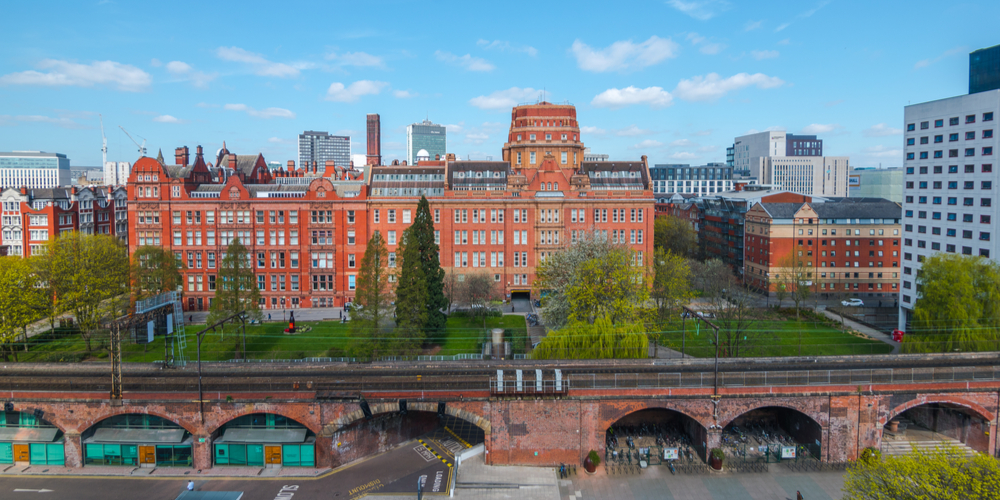
The School of Medicine
The University of Manchester’s School of Medicine is one of the largest in England. With over 2000 undergraduate students and 1200 postgraduates, the School consistently places the University at 1st or 2nd for medical study in the national league tables. The School is also part of a partnership involved in the recently-unveiled Manchester Academic Health Science Centre.
Undergraduate Medicine Programmes
The School’s MBChB degree programme offers a standard 5-year programme and a 6-year programme with an extra foundation year.
Each year concentrates on a different set of anatomical systems while building clinical expertise. Year 1 combines academic learning with Early Clinical Experience units, wherein students visit hospitals and GP surgeries to learn basic clinical skills and develop their communication abilities. In Year 2, students also start compiling a course-long evaluation portfolio with the guidance of tutors. Years 3 and 4 emphasise clinical teaching, with students being placed in one of four teaching hospitals around the county, and introduce an end-of-year Student Selected Component (SSC) for further study of a selected patient or condition, along with a Project Option at the end of Year 4. Year 5 consists of practical application study: an elective period, community clinical placement, teaching hospital work, apprenticeship in a district general hospital, and a shadowing period.
For students with AS or A2-level French, Spanish or German, the MCBChB with European Studies incorporates language studies into the medical course material as preparation for study and clinical placements abroad. Intercalated Degree options are also available for students wishing to undertake a BSc (Hons) or Masters in a specialist area related to medicine.
Postgraduate Medicine Programmes
Graduates seeking to enter primary care have the option of pursuing an MD or a ChM (Master of Surgery) degree, as well as an MPhil or PhD in a specialist subject of their choice. A wide range of MRes degrees are also available for students who intend to enter the fields of research or academia.
The School’s Postgraduate Taught degree programmes offer both 1-year full-time options and 2-year or 3-year part-time options. Degrees available include the MSc, PGDip and PGCert; several interdisciplinary programmes also involve combined degrees. The Postgraduate Taught programmes are primarily geared towards academic or research careers, though the course content can also be applied in clinical practice.
The School of Dentistry
The University of Manchester’s School of Dentistry is continuously ranked among the UK’s top dental schools, and in a recent government review was awarded the highest possible scores with special commendation for student support and guidance, IT infrastructure and emphasis on problem-based learning.
Undergraduate Dentistry Programmes
The School of Dentistry’s BDS degree programme offers a standard 5-year programme and a 6-year programme with an extra foundation year.
With an emphasis on enquiry-based learning and practical experience, the programme is structured around five integrated themes:
- Human Health and Disease
- The Mouth in Health and Disease
- Clinical Competence
- Scientific Understanding and Thought
- Team Working, Communication Skills, ICT and Reflective Practice
The course incorporates clinical teaching at an early stage, and later allows students to gain field experience in community outreach clinics.
Intercalated Degree options are also available for students who have demonstrated outstanding academic performance and who wish to study for a BSc (Hons) or Masters in a related field.
Postgraduate Dentistry Programmes
The School offers a wide range of Postgraduate Taught and Postgraduate Research programmes. Postgraduate Taught degrees available include MSc, MSc (Clin), and interdisciplinary MSc courses such as MSc/PGDip and MSc/PGCert degrees. Postgraduate Research programmes include MPhil, PhD and Dental Science Clinical PhD (Clin) degrees. Some courses require evidence of professional experience along with academic qualifications.
Student Life
The City
The vibrant, cosmopolitan feel of Manchester makes the city an excellent place to study.
As Manchester was the home of Britpop in the late 1980’s/early 1990’s, the city is home to myriad live music venues, concerts and clubs. Manchester is also devoted to the arts, with several major galleries in or near the city centre, and one (the Whitworth Gallery) hosted by the University itself. For shopping, Manchester boasts a number of independent boutiques as well as chain retail stores. The city centre also contains a wide range of ethnic, traditional and modern restaurants.
Student Activities
The University offers a huge variety of student societies with something to fit every interest. Society categories include Arts, Campaigning, International, Religion, Department, Common Interest and more.
The Athletic Union sponsors over 40 sports clubs at all levels, while the Armitage Sports Centre, Sugden Sports Centre, Manchester Aquatic Centre and Wythenshaw Sports Ground provide exercise and swimming facilities, sports fields and pitches, and other fitness activities for students.
Student Services
A number of advisory services are available to help students through academic life. Academic advisors can discuss and offer support regarding academic or study issues, while hall tutors and hall advisors are on hand to discuss both personal and academic matters. The Student Counselling Service provides free, confidential support for students in one-on-one and group settings.
Specialist international advisors are available for free advice and information on topics of concern for international students such as immigration and visas, work permits, and academic issues. The Careers Service provides guidance, support and information on internships and careers.
For disabled students, the Disability Support Team can arrange for personal support workers, special facilities, and academic provisions. Students with children can make use of the University’s childcare facilities; the University can also provide references to schools and private nurseries.
